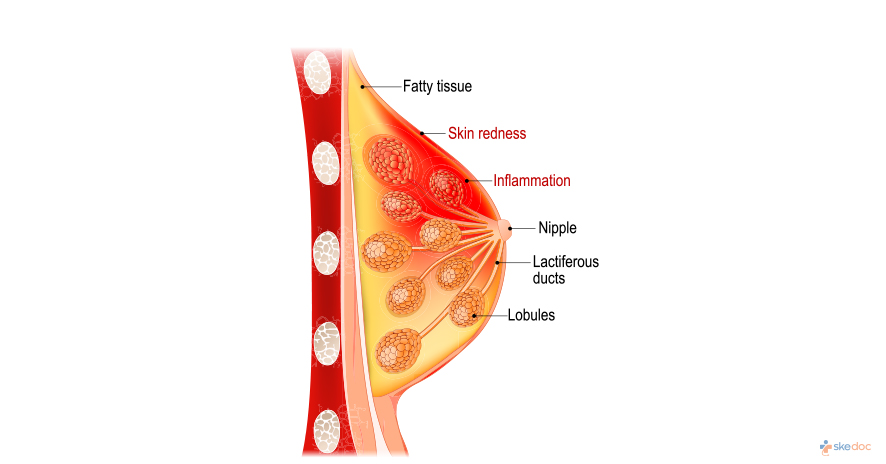Allergy
Blood Diseases
Bone & Joints
Brain
Cancer
Child Care
Cosmetic Surgery
Diabetes
Endocrinology
ENT
Eye
Gen Medicine
General Surgery
Heart
Kidney
Lifestyle
Liver & Digestive
Lung
Men’s Health
Mental health
Physiotherapy
Rheumatology
Skin and hair
Sleep Disorders
Spine
Transplant
Women Health
Thyroid
Vascular Surgery
Mastitis

What is Mastitis?
Mastitis, also known as breast inflammation, is a condition in which there is an inflammation of breast tissue with or without infection. It is commonly seen in women who are breastfeeding, but it can affect anyone, including men.
Is mastitis condition a medical emergency?
Mastitis is not a medical emergency.
Types
Mastitis may be classified as follows:
- Puerperal Mastitis: It is also known as lactation Mastitis; commonly seen in women who are breastfeeding
- Non-puerperal Mastitis: It is seen in women who are not breastfeeding
- Periductal Mastitis with duct ectasia: Inflammation associated with widening of the milk ducts; most often seen in teenagers and women in their early 20s, and women close to menopause
- Granulomatous Mastitis: It may occur secondary to conditions such as tuberculosis or sarcoidosis; it may appear similar to breast cancer
- Comedo Mastitis: It is similar to granulomatous Mastitis, but there is damage and destruction of breast tissues present in this condition
- Recurrent Mastitis: It may occur due to the presence of a breast abscess or Methicillin-resistant bacteria
- Fungal Mastitis
Causes
It is an inflammation of breast tissue, and in most cases, it is due to obstruction and blockage of the milk ducts. Some factors that can result in mastitis include:
- Improper expressing of milk leads to stagnation and blockage of the milk ducts
- Bacterial infection can be transferred from the infant's mouth to the milk ducts
- The cracks and sores on the nipples can lead to infection of the milk ducts
- Presence of breast abscess
- Infection or contamination of breast implants
- Trauma to the breasts
Risk factors
Factors that increase the risk of mastitis include:
- Wearing tight-fitting bras or clothes when lactating
- Improper breastfeeding
- History of Mastitis during lactation
- Diabetes
- Obesity
- HIV infections
- Weak immune system
Symptoms & signs
The signs and symptoms associated with mastitis include the following:
- Warm skin over the breasts
- Redness of skin over the affected breast
- Pain when touched
- Swelling of the breasts
- Small lumps in the breast
- The feeling of being unwell
- Burning sensation when breastfeeding
Other symptoms that may be present include:
- Fever – usually moderate or high
- Body aches
- Chills
Investigations
Mastitis is diagnosed mainly through clinical evaluation. Additionally, some investigations that are advised include:
- Laboratory tests:
- CBP & ESR
- Blood Sugar levels
- Cultures and sensitivity tests from breast milk – if the infection is suspected
- Imaging tests:
- Ultrasound: If a breast abscess or tumor is suspected
- Mammogram: If not responding to conservative therapy
- Breast biopsy: It may be advised if not responding to conservative therapy
Diagnosis
A diagnosis is established based on medical history, clinical evaluation, and results of the investigations, if any
Treatment options
The treatment of mastitis depends on the type of mastitis that is present and the severity of the condition.
Medical management
Medical management of this condition may include the following:
- Antibiotics: Such as amoxicillin-clavulanate or dicloxacillin; cephalexin or clarithromycin if antibiotic intolerance or allergies are present; clindamycin or ciprofloxacin if MRSA is suspected
- Antifungal Agents: Such as nystatin or topical ketoconazole if fungal infection is present.
- Intravenous Antibiotics: if breast abscess is present
- Pain relievers: for the management of inflammation and pain
- Steroids: for the management of granulomatous Mastitis
Interventional including surgery and indications for surgery
Interventions may only be required if the breast inflammation leads to the formation of a breast abscess, and the procedure would include irrigation and surgical removal of the dead and decaying tissue. Interventions such as aspiration and drainage may also be done in granulomatous Mastitis.
Role of Diet/ Exercise/ Lifestyle changes/ Preventive measures
Some measures that can help with the management of this condition include:
- Learning the correct techniques for breastfeeding
- Avoiding overfilling of breasts before breastfeeding
- Using warm and moist heat to the breast to ensure proper draining of breast milk
- Frequently changing feeding positions while breastfeeding
- Manually expressing a small amount of milk before breastfeeding
- Ensuring that the breasts are empty after breastfeeding; manually expressing remaining milk after a breastfeeding session
- Breastfeeding with the affected breast if Mastitis is present; uncomplicated Mastitis is not a contraindication for breastfeeding
- Getting adequate rest
- Avoiding tightfitting bras and clothes when lactating
Complications
Complications associated with mastitis include:
- Formation of breast abscess
- Sepsis
- Emotional distress due to inability to breastfeed
Prognosis
The prognosis is generally good, and proper care and management resolve the condition.
When to contact the doctor or hospital? / How to identify the emergency or complications?
It is advisable to seek medical attention if the signs and symptoms of breast inflammation are noticed.
Indications for hospitalization if required
Hospitalization is not required for the management of breast inflammation. Interventions for the management of complications may require very brief hospitalization.
Suggested clinical specialist/ Departments to consult for this condition
- Gynaecology
- Obstetrics
- General Surgery
Was this article helpful?
YesNo




